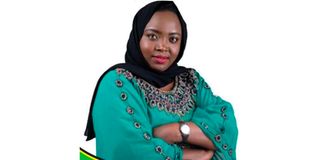I will win, says first Nubian woman candidate for Kibra MP seat

Hamida Malasen who is vying for Kibra parliamentary seat on an Amani National Congress (ANC) ticket.
What you need to know:
- Hamida Malasen is the first woman Nubian aspirant to get the blessings of the Nubian Council of Elders and the Nubian religious leaders to plunge into politics.
- She has made a name in Kibra through the work her NGO does.
- Her work has seen her receive a United Nations award for her environmental programs.
- Her main campaign issues are climate change and environmental matters.
Although she didn’t perform to her expectation in the 2018 Kibra parliamentary seat, Hamida Malasen says the contest prepared her well for the 2022 election.
Five years later, Ms Malasen believes she is capable of winning the seat on Amani National Congress (ANC) ticket.
The founder of Mazingira Women Initiative, a non-governmental organization (NGO) that addresses issues around environmental justice, women and human rights; Ms Malasen is the first woman Nubian aspirant to get the blessings and nod of the Nubian Council of Elders and the Nubian religious leaders to plunge into politics.
“Gender is no longer an issue, thanks to the Constitution of Kenya, which has a clause on affirmative action and two-thirds gender rule. I believe the next Parliament will have more women elected and one of those will be me.”
Ms Malasen has made a name in Kibra in the past five years, thanks to the work her NGO does. Her work has seen her receive a United Nations award for her environmental programs. Her project has also been recognized by Council of Governors.
Environmental issues
So far, Ms Malasen, whose nickname is Mama Mazingira, and her team have been on the ground campaigning in the five wards, moving from door to door, and holding town hall meetings to woo the more than 118,000 registered voters in Sarang’ombe, Woodley, Makina, Laini Saba and Lindi villages.
Her main campaign issues are climate change and environmental matters.
“I am into climate change and environmental issues. I am determined to serve my people, as I have done in most of the five wards. I am also a critical thinker and through my NGO we have held many capacity-building forums to empower our women, youth and people living with disabilities.”
Her community programmes on waste management and disposal has created employment opportunities for many youth and women. This has increased their source of income under the slogan “waste is wealth.”
Some of those programmes in Kibra have been done jointly with the National Youth Service, the Nairobi Metropolitan Services, and international NGOs.

Ms Masalen (second left) with other ANC officials speak to journalists at their party offices in Nairobi last May.
Ms Malasen has also partnered with local and foreign well-wishers to implement her ambitious project of planning more than 500,000 fruit seedlings in the capital city starting with Kibra. So far, they have planted 7,000 seedlings mostly in schools, river banks, and public hospitals.
But her quest for the MP position has come with its share of challenges. She has had to face rivals in big national political parties who are well resourced and have vibrant support machinery.
Without such support, Ms Malasen is focusing on lobbying for support from donors to fund her campaign and take her through capacity-building programs around fundraising, mobilization and strategic engagements with voters and opinion leaders.
So far, she has set up her campaign teams, made several media appearance to sale her manifesto and brought key players like women, elders and youth leaders on board.
Among the major challenges she has faced, she says, are lack of funding, poor media coverage and a culture of handouts.
Covid-19
The handouts culture has been worsened by the recent Covid-19 restrictions and regulations by the national government, which left hundreds of people jobless, leading to rise in poverty level and dependency syndrome.
Ms Malasen also believes that “most women fall by the roadside because of lack of funds, lack of political strategies, know how on networking, and how to woo voters.”
“I am ready to be part of the change, we don’t have to give handouts but convince the people that their problems can best be addressed once they elect me and I implement my manifesto. But they tell me off saying: “you have a good manifesto, but we cannot eat it here and now!”
All is, however, not lost. She is happy there is a shift in thinking about women leadership and a focus on electing leaders who are progressive in their thinking and not those who give handouts.




